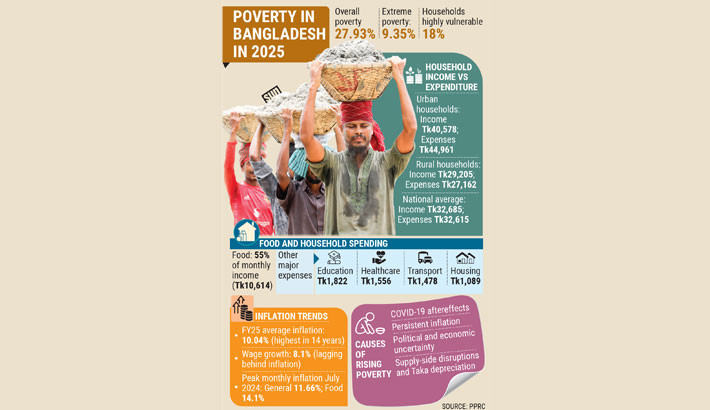1 in 4 now poor as persistent inflation squeezes families
PPRC survey shows poverty climbing to nearly 28%, extreme poverty nearly doubling in three years

Photo: Daily Sun
Poverty in the country has surged to its highest level in years, with nearly 27.93% of the population now living below the poverty line – up from 18.7% in 2022 – and extreme poverty rising to more than 9% from 5.6%, according to a new national survey.
The report, released by the Power and Participation Research Centre (PPRC), warns that households are spending more than half their monthly income on food and that almost one in five families remain at risk of falling into poverty at any time.
The study, titled Economic Dynamics and Mood at Household Level in Mid-2025, found that urban households have been hit hardest. Their average monthly income has fallen from Tk45,578 in 2022 to Tk40,578, while expenses have climbed to Tk44,961, leaving many families worse off and unable to save. By contrast, rural households reported modest income growth, rising to Tk29,205 from Tk26,163 in 2022, though costs also increased to Tk27,162.
Nationally, the average household earns Tk32,685 and spends Tk32,615, leaving almost no scope for savings. Food costs dominate family budgets, now consuming nearly 55% of expenditure, with smaller shares going to education, healthcare, transport and housing.
Experts warn of structural inflation
Economists say the findings confirm that Bangladesh is facing a deeper, structural crisis rather than a temporary setback.
Dr Mustafa K Mujeri, executive director of the Institute for Inclusive Finance and Development (InM) and former chief economist of Bangladesh Bank, told the Daily Sun, “We are witnessing persistent, structural inflation driven by supply-side disruptions, taka depreciation and global market volatility.
“In urban areas, rent, food and transport costs have skyrocketed, while wages, particularly in the informal sector, have stagnated. This widening gap is squeezing the working class and pricing the poor out of basic nutrition.”
Dr Fahmida Khatun, executive director of the Centre for Policy Dialogue (CPD), added, “Inflation has been on an upward trend for the past three years, putting immense pressure on household livelihoods. Families are depleting their savings simply to survive, and those just above the poverty line are now at risk of falling below it. Even the middle class is struggling to maintain their previous quality of life.”
Inflation at a 14-year high
The Bangladesh Bureau of Statistics reported that average inflation in the 2024-25 fiscal year stood at 10.04%, the highest in 14 years. Wage growth was just 8.1%, failing to match soaring living costs.
Inflation hit record levels in July 2024, when general inflation reached 11.66% and food inflation rose to 14.1%. Although both eased in the following months, annual averages show the lasting impact of elevated prices on low- and middle-income families.
Call for urgent policy action
Presenting the PPRC report in Dhaka, Executive Chairman Dr Hossain Zillur Rahman said the country faced a “continuity of crisis” marked by the aftershocks of COVID-19, high inflation in 2023 and political and economic turbulence in FY25.
He warned of an “urgent crisis of job creation” and urged the government to adopt a “people’s lens” in economic planning, stressing that national priorities must move beyond GDP growth to focus on equity and welfare.
Dr Hossain Zillur Rahman highlighted rising chronic illness, the vulnerability of female-headed households, mounting household debt, worsening food insecurity and poor sanitation as areas requiring immediate attention.
He noted that 36% of the population still lack access to hygienic toilets, threatening progress towards the 2030 Sustainable Development Goals.
The World Bank’s “Bangladesh Development Update 2025” echoed these concerns, estimating that three million more people could fall into extreme poverty this year, lifting the overall poverty rate to 22.9% and leaving almost 39 million people classified as poor.
The reporter can be reached at: [email protected]


